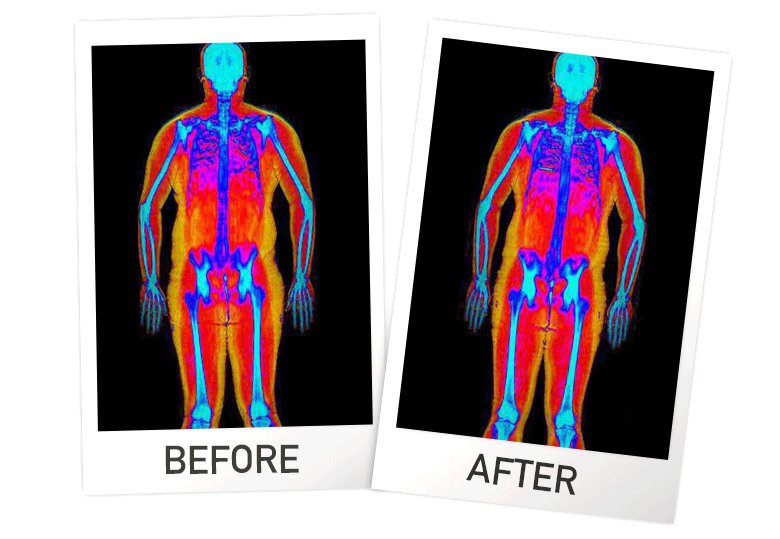For many of us, omega-3 fatty acids — especially those found in fatty fish — are synonymous with heart health. While much of the attention has remained focused on cholesterol, blood pressure and inflammation, another benefit of these fatty acids is now entering the conversation: skeletal muscle. Researchers are increasingly finding that omega-3s, particularly eicosapentaenoic acid (EPA) and docosahexaenoic acid (DHA), may play a role in maintaining and even enhancing muscle health.
Muscle Quality
Muscle health often flies under the radar until it starts to deteriorate. Sarcopenia, a significant loss of muscle mass and function with age, is a silent epidemic that affects over 10% of people over the age of 60. The condition causes muscle weakness which can lead to an increased risk of falls, fractures, and chronic disease, along with a loss of independence.
In a landmark 2011 study, Smith and colleagues conducted a randomised controlled trial in older adults, supplementing participants with 1.86g of EPA and 1.50g of DHA daily over six months. The results were striking: those in the omega-3 group experienced a 3.6% increase in thigh muscle volume and greater gains in strength compared to the control group (Smith et al., 2011). Crucially, this occurred without any intervention for physical activity, suggesting omega-3s alone had a direct effect on muscle quality.
Building and Maintaining Muscle
So how does fish oil actually strengthen muscle? Part of the answer lies in the way omega-3s influence anabolic signalling — the biological process that promotes muscle growth. In a 2012 study, older adults who supplemented with omega-3s showed a significantly greater rise in muscle protein synthesis in response to insulin and amino acids, compared to those who didn’t take the supplements (You et al., 2012). This suggests omega-3s may improve the muscle’s anabolic response — a vital benefit in ageing, when this response is typically blunted.
Omega-3s have also been shown to reduce inflammation, a known contributor to muscle breakdown. Chronic low-grade inflammation, common in ageing and obesity, can interfere with the body’s ability to build and repair muscle. By modulating inflammatory markers, omega-3s may help to create a more favourable environment for muscle maintenance (Rodacki et al., 2012).
It’s Not Just About Muscle Size
While a lot of the discussion around muscle health focuses on mass, function is also meaningful: strength, power, and coordination are what contribute to athletic performance in active individuals, and a reduction in falls risk in the elderly.
Rodacki et al. (2022) examined the impact of fish oil supplementation in elderly women and found significant improvements in muscle function and walking speed, even when muscle size didn’t increase dramatically.
Similarly, a 2022 randomised controlled trial by Smith et al. explored the effects of omega-3s on neuromuscular performance. The findings pointed to improved lower limb strength and faster reaction times in the supplemented group. The study didn’t just measure what the muscle looked like — it tested what it could do.
Implications for the Young and Active
While the elderly stand to gain the most, younger, active individuals may also benefit. A study by McGlory et al. (2016) explored omega-3 supplementation in healthy young men undergoing a short period of limb immobilisation — a simulated model of injury-induced muscle loss. The group taking omega-3s experienced less muscle atrophy and better preservation of strength than those who did not.
For athletes recovering from injury, or even for those taking a break from training, omega-3s could offer a nutritional edge in maintaining lean mass.
Practical Considerations
Most studies reporting muscle benefits used relatively high doses — often around 2 to 3 grams of combined EPA and DHA per day — and required at least 12 weeks of supplementation. This is far more than most people consume through diet alone. A single serving of salmon might contain 1 to 1.5 grams, but most common fish oil capsules have less than that.
That doesn’t mean everyone should start taking high-dose omega-3s without caution. While these supplements are generally well-tolerated, they can interact with medications such as blood thinners.
More importantly, omega-3s should be seen as complementary to a healthy lifestyle, not a replacement. In nearly every study where benefits were found, participants were still exercising, still consuming adequate protein, and still engaging in regular exercise.
A Nutritional Nudge, Not a Silver Bullet
Omega-3s are not magic pills. They won’t replace lost time at the gym or rebuild decades of sedentary living. But what the research does show is that these fats, long championed for heart and brain health, may support skeletal muscle and physical function.
With ageing populations and sedentary lifestyles, even small nutritional interventions that maintain strength and independence have never been more important. And it seems that along with lifting weights and eating enough protein, adding some omega-3s — whether from fatty fish or supplements — could be a simple yet powerful tool for maintaining healthy muscle tissue.
References
McGlory, C., et al. (2016). Omega-3 fatty acid supplementation attenuates skeletal muscle disuse atrophy during short-term limb immobilization in healthy young men. FASEB Journal, 30(2), 435–445.
Smith, G.I., et al. (2011). Omega-3 polyunsaturated fatty acids augment the muscle protein anabolic response to hyperinsulinemia-hyperaminoacidemia in healthy older adults. The American Journal of Clinical Nutrition, 93(2), 402–412.
Smith, G.I., et al. (2022). Omega-3 fatty acid supplementation improves neuromuscular function in older adults: A randomised trial. The Journals of Gerontology: Series A, 77(9), 1701–1708.
Rodacki, C.L.N., et al. (2012). Fish-oil supplementation enhances the effects of strength training in elderly women. American Journal of Clinical Nutrition, 95(2), 428–436.
Rodacki, C.L.N., et al. (2022). Effects of fish oil supplementation on physical function in elderly women: A randomised controlled trial. Clinical Nutrition, 41(1), 119–126.
You, J.S., et al. (2012). Omega-3 fatty acids enhance anabolic signalling in skeletal muscle of older adults. Aging Cell, 11(4), 678–685.


